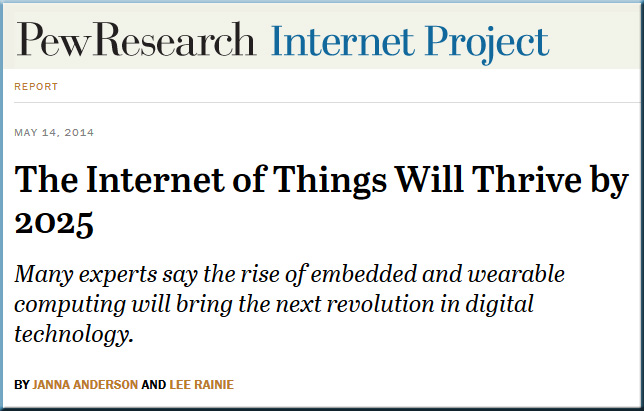Also see:
Where the Internet of Things could take society by 2025 — from centerdigitaled.com by Tanya Roscorla
Excerpt:
The Pew Research Center Internet Project and Elon University’s Imagining the Internet Center released the report on Wednesday, May 14, as part of an ongoing future of the Internet series inspired by the Web’s 25th anniversary. Eighty-three percent of these experts, which included education leaders, agreed that the Internet of Things would have “widespread and beneficial effects on the everyday lives of the public by 2025.” The remaining 17 percent said it would not, and both camps elaborated on their answers in paragraph form.
- The Internet of Things and wearable computing will take major steps forward in the next 11 years.
- Increased data from connected things will cause privacy concerns to come to the forefront and encourage the growth of profiling and targeting people, which will greatly inflame conflicts in various arenas.
- Despite advancement in information interfaces, most people won’t be connecting their brains to the network.
- Complicated, unintended consequences will arise.
- A digital divide could deepen and disenfranchise people who don’t choose to connect to the network.
- Relationships will change depending on people’s response to the Internet of Things.
From DSC:
As with most technologies, there will be positives and negatives about the Internet of Things. To me, the technologies are tools — neutral, not value-laden — and it’s how we use them that adds moral, political, legal, ethical, or social perspectives/elements to them. With that said, I’m quite sure that the IoT will have unintended consequences (#4 above). Also, item #5 — “A digital divide could deepen and disenfranchise people who don’t choose to connect to the network” — is especially troublesome to me, along with the topic of privacy concerns as mentioned in #2.









